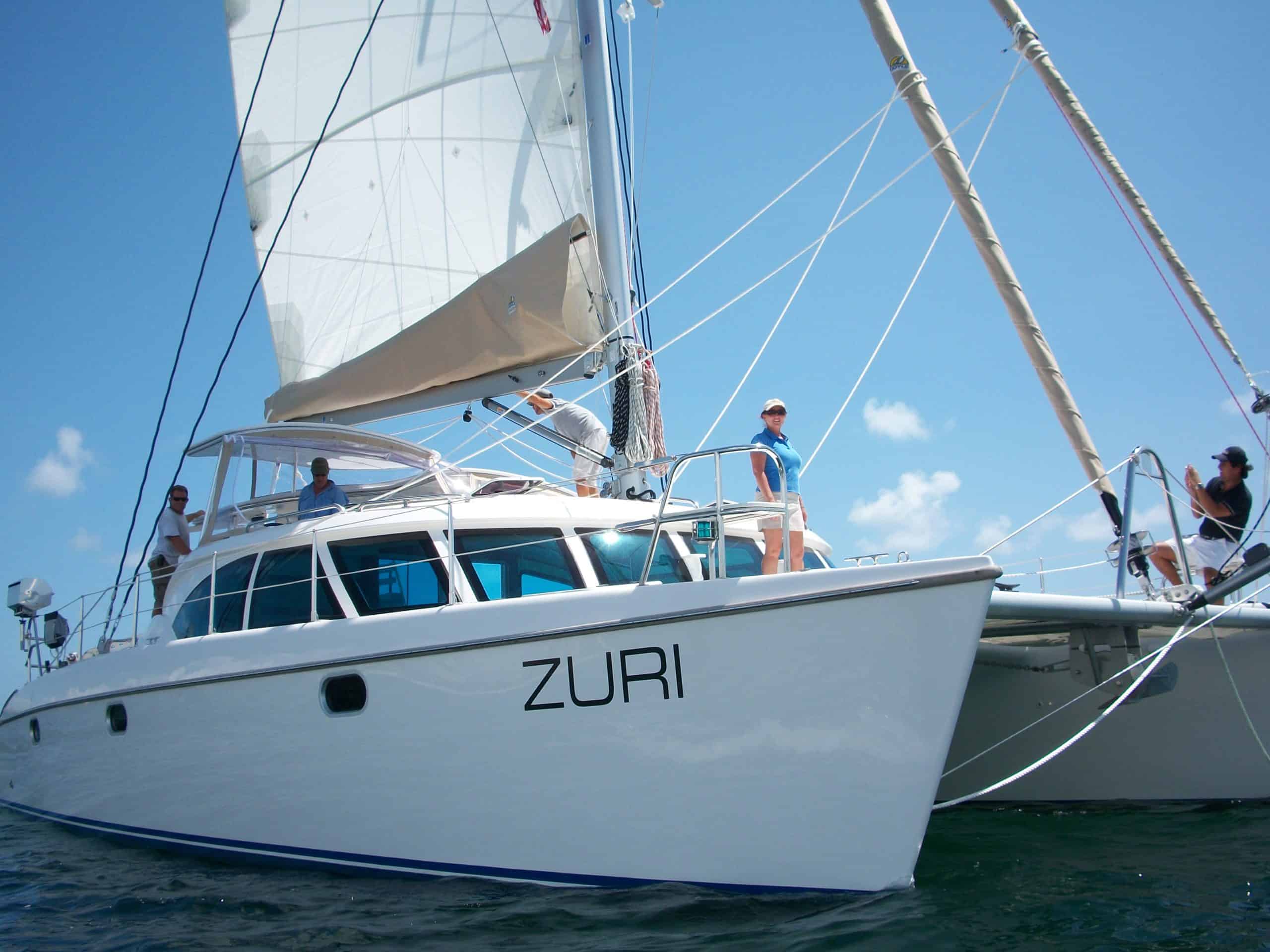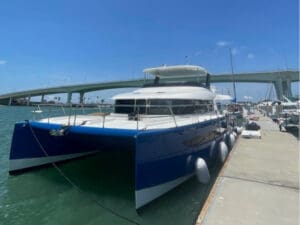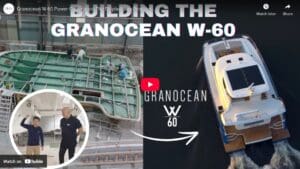Overseas Radio Network – Tips on Living and Working on a Yacht, Costs of Cruising
 In the Overseas Radio Network Show 2, Segment 3, Stephen and Estelle talk about:
In the Overseas Radio Network Show 2, Segment 3, Stephen and Estelle talk about:
- More on cost of cruising
- Working while cruising
- Running our sailing school
- Best ways to get sailing experience
GARY FRETZ: Welcome back to our show. I am Gary Fretz and coming up in our next segment we are talking to Stephen and Estelle Cockcroft about all their adventures sailing all over the world. And we were talking about how much cruising costs. And so, let’s not beat around the bush. Give me some dollars per month that most cruisers spend.
For a transcript of this podcast, click “read more” below.
Cost of Cruising, Continued
STEPHEN COCKCROFT: Well, it depends where you’re cruising. If you are cruising the Caribbean Islands, the Windwards and Leewards, where there is a big population of cruising boats and charter boats, it can be expensive because all the prices are high. The truth is that you probably could get away very comfortable with around $3, 000 a month. You would be able to go do interior trips. You’d be able to go out eating. You would be able to maintain your boat and all out and really have a great lifestyle on about $3000 dollars a month.
We met cruisers who live on $500 a month. The other option, of course, if you want to, there is a lot of work when you travel through these islands to delivering boat, capturing day charter boats, working in restaurants, helping people repair boats, etc, etc. So the high end I would say is $3000 a month and the low end I would say is $1500 a month for Americans. You know, because we are used to a lot more comforts than other people from less developed countries.
Working While Cruising
GARY: Wait a second, you mean you don’t need a work permit to work in a restaurant or do some of these other things?
STEPHEN: We never found it a problem. Delivering boats you certainly don’t need a work permit. That’s what I did. I did a lot of deliveries for charter companies and no permits were required for that. Working in restaurants, Estelle used to work as a bartender and made very good money, and no work permit required you just transient labor.
ESTELLE COCKCROFT: And then, of course, some of our friends who are doctors and nurses. And all these islands third world countries are desperately in need of medical personnel and they go and work there and the locals absolutely welcome them to work in their hospitals.
GARY: What are some of the other technical trades you were telling me are in big demands around the world?
STEPHEN: Well, if I were to do it over again I would certainly develop a couple of skills specific to boating. Every anchorage you are in is always full of cruisers and as you know boat always have some problem or another. We had guys who were welders, carried little welding machine and they were able to do welding .
Diesel engines are always giving problems and a very experienced diesel guy would always have work. People were paying them in money or in beer and barter trade to help fix their diesel engines. And another good…there are really good course available you could become a pretty good diesel guy jut by doing course hat are available in the US.
Another very good skill to have that you can sell that is marketable would be electrics and especially electronics. Learn, become an expert on a specific brand of electronics because everyone always has problems on electronics, on their GPS and their auto pilot. So there are a lot of way, there are a lot of skills you can develop before you go that can sustain you.
GARY: Estelle, you were talking about having a sewing machine on your boat. What is that about?
ESTELLE: Oh, yeah, I had my sewing machine. I was a fashion designer in my former life. But what I used to do I used to sew canvas. I had a heavy duty machine I used to sew canvas. But also I had my regular machine that I made clothes for people. I made courtesy flags. People are always coming running over you know asking me to fix a thing here or there and so I was always busy and charging for it.
GARY: You know, and I heard about some guys that hooked up with charter companies. And the charter companies would sell these one-way charters from like the Virgin Islands to Grenada and then they needed somebody to bring the boats back. So these guys would just congregate around Grenada and they would make $600 or so, sailing the boat back to the Virgin Islands. And then they would have to buy an air ticket back. I think that’s a good way to pick up some extra change, too.
STEPHEN: Well that’s one of the ways. I did most of my deliveries in fact were for charter companies. I moved between the islands and, in fact, even did a delivery from Annapolis back down to St Martin which was quite lucrative. So, there is always work, if you want to work.
Running Our Sailing School
GARY: Now, you all ran a sailing school or you were doing this week long learn to sail and coastal schools tell me about that and you made some pretty good money doing that didn’t you.
STEPHEN: Well, I started after I got an ASA instructor license. And I worked for a school down in St. Martin. That evolved to where we used our own boat to run the sailing schools and we made very good money. We would make enough money in 6 months to live for the whole year and didn’t have to touch our nest egg at all which was very, very nice situation for us.
ESTELLE: Yeah, we trained couples specifically to do the sailing schools with us on board. We teach them, you know, just general lifestyle, the sailing lifestyle. So it is not as much only about sailing but how to live the lifestyle.
GARY: Now, how would you typically operate? I mean, like they come on the boat on a Saturday or a Sunday right and then what happens every day?
STEPHEN: Well, they arrive typically on a Saturday which they spend Saturday night on the dock Sunday. We will have our safety briefing and teach them all about function of the boat. Then we go out sailing. The emphasis is about liveaboard training. The people would really understand the intricacies of sailing and living aboard there are a lot of peripherals like dinghy and outboard, etc., proper anchoring, anchoring etiquette from location to location just teach people the live aboard lifestyle and teaching them also of course giving them the ASA course.
GARY: Is there some sort of certification you get when you attend the school?
STEPHEN: The ASA courses that we did the 101,103, 104, and 114, which were the 114 is for catamarans.
GARY: That’s the American Sailing Association.
STEPHEN: That’s right, yeah. And so people would have a great vacation they would a live aboard experience and they would leave with a certification. Estelle was very involved as well we did it as a couple and Estelle contributed hugely.
ESTELLE: The ladies would always come and say well we don’t really…I am doing this because my husband is doing it or he wants me to do it. By the end of the trip we battle to get the girls away from the helm because they really so enjoy it. Sailing is pleasurable…it is nothing more free than to live this lifestyle and once you experience it, it is very hard to go back.
STEPHEN: As soon as we discovered you didn’t get a bill for the wind, we were hooked. If you want to learn more about the sailing schools, the liveaboard courses, we have a website which is www.catmaranguru.com where we cover all aspects of cruising. [Check out the ASA sailing school and learn to sail and liveaboard with Stephen and Estelle. ] Estelle has her special section called gurly guru with all her favorite stuff. I am sure the ladies would enjoy going there and see what a lady cruiser has to say. [Checkout Estelle’s Gurly Guru recipes for your galley.]
Best Ways to Get Sailing Experience
GARY: Let’s talk about other ways to get experience. I found that when I was growing up the fastest way to get knowledgeable is by racing because when you racing on a boat you are forced to go out in heavy winds, rain storms, at night, just about every type of situation you can imagine was encountered doing that. And so I would recommend anybody to look into being a crew on a race boat. What are some of the other ways people get experience?
STEPHEN: Well have taught hundreds of people to sail. In fact we have some of our second ever sailing school students who did a sailing school with us ended up buying a boat. And they left Chicago couple months ago they been all the way down the Mississippi down the Gulf [of Mexico] and they are coming to visit us in Fort Lauderdale in 2 days’ time.
Another good way to get experience is to charter boats you can go to many locations around the world and charter boats from all the established charter companies. This is probably a great way to get started once you done that I suggest you look for deliveries as a crew on deliveries with experienced captain. That’s a great way to get some mileage and get some offshore experience. Estelle, do you have anything to add to that?
ESTELLE: Chartering obviously is a fabulous way to learn we found that almost everyone of out sea school students after they have done the sailing course to brush up on their skills went chartering and they used the skills that they learned ad that’s how they ended up buying their boat.
GARY: What about I heard about these charter companies that have programs of reciprocal use where if you are an owner you get to go around the world? Why don’t we talk about that when we get back from the break? we are going to be right back and we will be talking again about getting experience on cruising this is Gary Fretz and you are listening to “Yachts the Perfect Escape Vehicle” on Overseas Radio Network.






